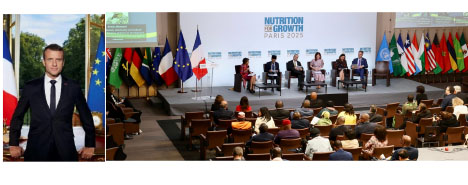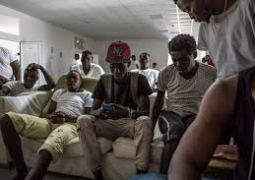
“I truly believe that our health and the health of the planet are inextricably linked,” he told the Paris 2025 Summit yesterday. “This is also a planetary issue, which is why I have pushed for France to support a global vision where strong agriculture and healthy nutrition are two pillars of our collective health. I have often called this ‘nutritional sovereignty’, in other words, the ability for a country to meet the needs of its people and especially its children.”
President Macron made these remarks at the Nutrition for Growth (N4G) Paris 2025 Summit that started Thursday 27 March in Paris, France. The two-day N4G Summit brought together delegates from across the world to discuss ways of fighting malnutrition.
“We are what we eat, said Hippocrates,” he quotes, saying: “Malnutrition, in all its forms, affects our societies, slows down economic growth and burdens future generations. This is why one of my main priorities, both domestically and internationally, is to invest in healthy and balanced nutrition.
“This is especially important to unlock our children’s potential and build more prosperous, fairer societies. In France, I pushed to make sure children can have a free breakfast at school, because it is impossible to learn on an empty stomach.”
He also pushed to ensure the state could reimburse schools’ meals for disadvantaged families, so they do not cost more than one euro, Macron said, adding that he supported ambitious bills in favour of nutrition equality while also supporting their farmers, and helping their schoolchildren have healthier, more local and sustainable diets.
He told delegates that under the leadership of France, several initiatives have already been implemented and have shown that they could provide concrete and effective solutions to meet these challenges.
For example, he cited, the Paris Agreement shows that no country will be forced to choose between the fight against poverty and the fight against climate change, adding that similarly, the Food and Agriculture Resilience Mission (FARM) has allowed the world to mitigate the potentially disastrous impacts Russia’s war in Ukraine could have had on global nutrition – and the Free School Meals Coalition offers each child in the world free school meals to make sure they can learn properly.
Jean-Noel Barrot, minister for Europe and Foreign Affairs, underscored that in a world beset by crises, taking action on food security and nutrition is a moral imperative and a global strategic challenge.
He said that in 2024, 343 million people faced high levels of food insecurity, 200 million more than before the COVID-19 pandemic, adding that poor nutrition makes populations fragile.
“A malnourished child is 11 times more likely to die than a well-nourished one,” Mr Barrot said. “On a national level, nutritional insecurity fuels social tensions, intensifies forced displacement and slows economic development.”
He said access to high-quality food is also a cause of many conflicts, with malnutrition both a cause and a consequence, adding that nutrition must therefore be integrated into crisis prevention and management strategies.
Thani Mohamed Soilihi, minister delegate for Francophonie and International Partnerships, said there can be no sustainable development without a well-nourished population.
“That said, 1 in 4 children under the age of 5 continues to suffer from malnutrition. Malnutrition is the leading cause of infant mortality, and it has incredibly damaging impacts on the physical and intellectual development of children,” he pointed out. “Anemia on the other hand affects 1 in 3 women, and it drastically reduces their prospects for socio-economic integration worldwide.”





